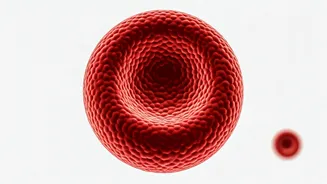Iron's Vital Role
Iron is a critical mineral, playing a pivotal part in children's health. It acts as an oxygen carrier, essential for delivering oxygen to all cells, enabling
energy production and overall function. Furthermore, iron contributes to cognitive development, supporting brain function and learning abilities. Adequate iron levels are also crucial for a robust immune system, helping children fight off infections. Without sufficient iron, children may experience fatigue, weakness, and impaired growth. It is, therefore, imperative to understand iron deficiency and how to prevent it. A deficiency can have wide-ranging effects, impacting a child's ability to thrive physically and intellectually. Recognizing the importance of this mineral and taking proactive steps can ensure children reach their full potential.
Visible Warning Signs
Several physical signs can indicate iron deficiency in children. One of the most common is fatigue and weakness; children may tire easily, lacking the energy for daily activities and play. Pale skin, particularly in the face, inside the eyelids, and in the nail beds, is another significant indicator. Additional signs may include brittle nails, a sore or swollen tongue, and frequent infections, as iron deficiency weakens the immune system. Behavioral changes can also signal a problem. Children might experience irritability, difficulty concentrating, and learning problems. In severe cases, iron deficiency can lead to pica, a craving for non-food items like ice or dirt. Paying close attention to these warning signs is crucial, as they could signify an underlying health concern. Early detection can allow for timely intervention and prevent long-term health complications.
Dietary Interventions
Dietary changes play a crucial role in preventing and managing iron deficiency in children. Including iron-rich foods in their daily meals is a simple yet effective strategy. Excellent sources of iron include lean meats, poultry, and fish, which provide heme iron, which is easily absorbed by the body. For vegetarian options, include iron-fortified cereals, beans, lentils, and dark green leafy vegetables like spinach. Combining iron-rich foods with vitamin C-rich foods, such as oranges, strawberries, and bell peppers, can boost iron absorption. Avoid giving children excessive amounts of cow's milk, particularly during meals, as it can hinder iron absorption. Encourage a balanced diet rich in various nutrients to support overall health and ensure children receive enough iron. Regular consultation with a pediatrician or a registered dietitian can offer tailored dietary advice for each child's specific needs, ensuring they stay healthy.
Preventative Measures
Proactive steps can prevent iron deficiency from developing. Regular check-ups with a pediatrician are essential, as healthcare providers can monitor iron levels and provide necessary guidance. For infants, exclusive breastfeeding for the first six months is recommended. Breast milk is easily digested and contains iron. If breastfeeding is not possible, iron-fortified formula is a suitable alternative. After six months, introduce iron-rich foods gradually while continuing breastfeeding or formula feeding. Discuss iron supplementation with a pediatrician, especially if a child is at high risk, such as those with premature births or certain medical conditions. Ensure children maintain a well-balanced diet that includes a variety of iron-rich foods. Furthermore, educate children about the importance of healthy eating habits early in life. By incorporating these preventive measures, parents can significantly lower the risk of iron deficiency and promote their children's well-being.
When to Seek Help
Knowing when to seek professional help is crucial. If parents observe any signs of iron deficiency in their children, they should consult a pediatrician promptly. The pediatrician can perform blood tests to measure iron levels and confirm the diagnosis. Further, they can recommend appropriate treatment, which may include iron supplements. Do not start iron supplementation without consulting a healthcare provider. They will determine the correct dosage and duration. During treatment, regular follow-up appointments will be necessary to monitor the child's progress and adjust the treatment if needed. Additionally, a healthcare professional can rule out any underlying conditions that might be contributing to the iron deficiency. Early intervention can prevent potential complications and ensure that children receive the best possible care, supporting their health and growth.




















